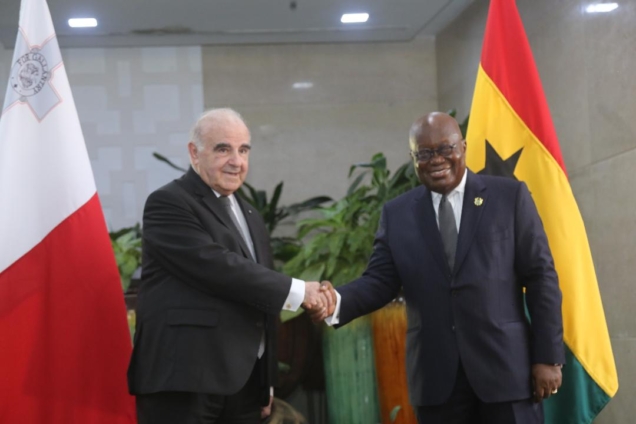Ghana and Malta have renewed their resolve to strengthen cooperation for the benefit of their respective peoples.
The two countries have committed to increasing trade volume and creating more opportunities for private investment between them.
To that end, a joint commission has been established to facilitate progress in all areas of mutual interest, and numerous agreements are being negotiated in stages in areas like higher education, aviation services, migration, and the hospitality industry, among others.
This was disclosed during a joint press conference by President Nana Addo Dankwa Akufo-Addo and his visiting counterpart from Malta, Dr George William Vella, at the Jubilee House, Accra after bilateral talks between both sides.
Dr Vella, who is at the head of a delegation of public servants and private sector representatives, is in Ghana for a three-day state visit to Ghana
He is the second leader from his country to visit Ghana in recent years.
Ghana and Malta’s ministerial delegations met on Friday to strengthen their already friendly relations while also exploring new areas of mutual cooperation.
Talks focused on improving the volume of trade between Ghana and Malta, mutual support for candidates from the two countries vying for positions in international organizations, migration issues, the reform of global governance institutions, and the deepening of political consultation on matters of mutual interest.
Presidents Akufo-Addo and Vella promised to collaborate to ensure reforms in the Security Council and solve migratory challenges.
They also said that they would look at the potential for trade, investment, and education.
This year marks the 50th anniversary of Ghana and Malta’s diplomatic ties, which were established in 1974.
Since then, Malta and Ghana have had strong and long-standing bilateral relations, which have been strengthened by several high-level visits over the years, as well as the signing of various agreements and memoranda of understanding (MOUs) focusing on various sectors.
President Akufo-Addo described Dr Vella’s visit as historic, as it was the second time a sitting President of Malta had paid a state visit to Ghana during his tenure.
He emphasized that as members of the Commonwealth, the two countries had similar ambitions and principles and that they had collaborated well on various issues over the years, particularly at the Heads of Commonwealth meetings.
The President stated that the bilateral meetings at the Presidency resulted in a renewed commitment to “further and promote mutual support at both bilateral and multilateral levels.”
He said the Maltese president and his team were determined to give voice to Ghana’s position and interest within the European Union, and Ghana would assist in facilitating the platform for Malta’s economic engagement with ECOWAS member countries to increase trade volumes and bring prosperity to the people.
Dr Vella, for his part, said that his visit would help to solidify shared vision and goals, congratulated Ghana on its 67th anniversary, and wished the country success in hosting the 13th African Games.
He said that the Maltese government’s decision to open its first sub-Saharan diplomatic presence in Ghana reflects the importance Malta places on future relations with Ghana, and also compliments Malta’s aim to strengthen relations and partnerships with individual African countries through its African strategy.
The Maltese President said his country would continue to “push for meaningful cooperation” with Ghana, not only at the political level but also through exchanges between the Maltese and Ghanaian private sectors and civil society.
“There is ample interest on both sides to further expand relations and collaborations in several sectors such as agriculture and fisheries, financial services, tourism and culture, climate change and environment, pharmaceutical and other sectors.
“We also hope our cooperation would lead to further meaningful exchanges that create opportunities for young people in Ghana through education, training and upscaling,” he said.
President Vella stated that Malta was willing to offer further opportunities for Ghanaians to study, specialise, and advance to higher educational institutions in Malta, including the University of Malta, the Malta College of Arts, Science, and Technology, the Mediterranean Academy of Diplomatic Studies, the Institute of Tourism Studies, and the International Maritime Law Institute.
On regional cooperation, he said Malta remained an ardent supporter of the constructive and positive relationship between Ghana and the European Union.
President Vella said that Malta would continue to voice its support and advocate for more cooperation between both sides to ensure peace, security, and prosperity in the region and around the world.
He noted that the interim economic partnership between Ghana and the European Union had made it easier for people to trade and conduct business with one another, and he hoped that it would lead to more integration in the global value chain.
With West Africa being the European Union’s largest trading partner in Sub-Saharan Africa, President Vella said there was significant potential for strengthening trade relations between the EU and the West African economic bloc, ECOWAS, which Ghana, and Malta could successfully tap into.
Regarding the increasing security situation in the Sahel region, he stated that existing dialogue on political and security issues between regional organisations must be strengthened.
President Vella said that Malta was concerned about the current migrant pressure from the central Mediterranean route, which has experienced significant growth and regular movements since 2020.
“We continue to underline that the root causes of irregular migration should addressed in a comprehensive and holistic manner this would mitigate reasons for displacement, while sustaining economic and social development in countries of origin.”
President Vella reiterated Malta’s commitment to maximizing the potential that exists within the Commonwealth family of nations, of which both Malta and Ghana are active members.
“The Commonwealth should not only remind us of our past and heritage that we share in common, for the Commonwealth has all the potential to be a powerful platform for future-sharing, connections, and ongoing dialogue also through its diversity,” he said.

